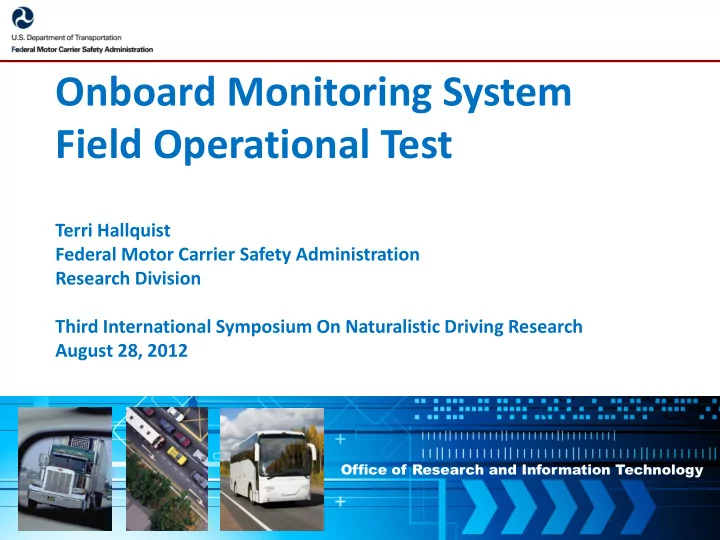

Onboard Monitoring System Field Operational Test Terri Hallquist Federal Motor Carrier Safety Administration Research Division Third International Symposium On Naturalistic Driving Research August 28, 2012 Office of Research and Information Technology
Contents Introduction Overview of Onboard Monitoring System (OBMS) Technology Suite Evaluation and Data Analysis Plan Continuous Data Collection Effort Project Status 2
Study Objectives To examine the effectiveness of onboard monitoring in improving driver safety performance with: Real-time feedback Coaching from safety supervisors Collect millions of miles of naturalistic large truck driving data to support future CMV safety research efforts. Project Team: Virginia Tech Transportation Institute and the University of Washington 3
OBMS: DriveVision Pro Forward Collision Warning Lane Departure Warning Drowsy Driver Detection Electronic Logbooks (EOBR) Driver Behavior Monitoring 4
Highlight of Key Technologies Video-based lane tracking (RoadScout) Video-based head/eye tracking (MASK) Event detection and driver behavior monitoring 5
In-Cab Feedback Driving Page Performance Events Safety Events Collision Avoidance Warnings Electronic Logs 6
Safety Data Flow Data Center Analysts validate event Note conditions Raw Event Narrative Video & Data Causal factors Responsibility Is the Event Coachable? Validated Video Events & Data Fleet Management Driver Driver Comparison Feedback Event Review & Coaching Safety Trend Analysis Feedback/Coaching Accountability 7
Study Design Equip up to 270 trucks with OBMS devices More than 500 drivers from three participating carrier fleets Drivers will be randomly assigned to three experimental groups 18 months of data collection 8
Experimental Design Three experimental groups Group 1: Baseline group Group 2: Longer-term adaptation group Group 3: Shorter-term adaptation group Q1 Q2 Q3 Q4 Q5 Q6 9
Potential Outcome 10
Research Questions Research Q1 : Can driver performance and safety improve over time with OBMS feedback and coaching? Research Q2 : If driving performance improves, does it remain improved over time? 11
Research Questions Research Q3 : How do the drivers’ opinions and attitudes towards the OBMS system and program change over time? Research Q4 : What are the costs and benefits to the carriers/drivers of system implementation? 12
Continuous Data Collection Collect more than 35 million miles of naturalistic truck driving data over 18 months Data will support future commercial motor vehicle research efforts Protection of drivers (human subjects) and participating fleets Access to naturalistic data 13
Project Status Carrier Participation 1 carrier committed and collecting full study data 2 carriers completed pilot, determining if they will continue with full study 2 carriers currently in pilot 14
Questions? Contact Information: Terri Hallquist theresa.hallquist@dot.gov 202-366-1064 15
Recommend
More recommend